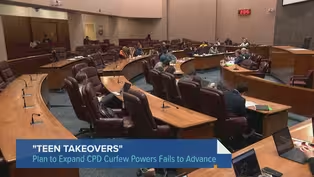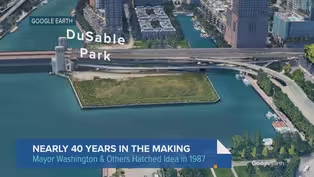Chicago Tonight: Black Voices
Local Stakeholders on Pritzker's Budget Proposal, Priorities
Clip: 4/30/2025 | 9m 34sVideo has Closed Captions
Lawmakers are finalizing the state’s budget, but not without some challenges.
Gov. JB Pritzker is proposing a $55.2 billion budget as budget watchdogs sound the alarm on the state’s $3.2 billion deficit. While Republicans say the state needs to cut spending and lower taxes, Democrats are raising concerns about cuts to services that families depend on.
Problems playing video? | Closed Captioning Feedback
Problems playing video? | Closed Captioning Feedback
Chicago Tonight: Black Voices is a local public television program presented by WTTW
Chicago Tonight: Black Voices
Local Stakeholders on Pritzker's Budget Proposal, Priorities
Clip: 4/30/2025 | 9m 34sVideo has Closed Captions
Gov. JB Pritzker is proposing a $55.2 billion budget as budget watchdogs sound the alarm on the state’s $3.2 billion deficit. While Republicans say the state needs to cut spending and lower taxes, Democrats are raising concerns about cuts to services that families depend on.
Problems playing video? | Closed Captioning Feedback
How to Watch Chicago Tonight: Black Voices
Chicago Tonight: Black Voices is available to stream on pbs.org and the free PBS App, available on iPhone, Apple TV, Android TV, Android smartphones, Amazon Fire TV, Amazon Fire Tablet, Roku, Samsung Smart TV, and Vizio.
Providing Support for PBS.org
Learn Moreabout PBS online sponsorship>> Illinois lawmakers are finalizing the states but state's budget for the next fiscal year.
But it's not happening without some challenges.
Governor JB Pritzker is proposing a 55.2 billion dollar budget as watchdogs sound the alarm on the state's 3.2 billion dollar deficit.
Well, Republicans say the state needs to cut spending and lower taxes.
Democrats are raising concerns about cuts to services that they say families depend on here to share their thoughts on the budget are Adams lead fiscal policy director at the Illinois Black Advocacy Initiative, J Deal.
Budget Analysis.
Director at the Center for Tax and Budget Accountability.
And Ted Dabrowski president of Wire points, independent nonprofit research and commentary organization focusing on Illinois's economy and governments.
Thank you all for joining us.
Good to see you again.
I'm Jay, let's start with you first, please.
Governor Pritzker gave his budget address in February.
Bring us up to speed on the budget status right now.
Yeah.
So currently it's the proposed budget and it's just over 55 billion dollars.
>> And for Fy 2026, it's really a flat budget over Fy 2025, levels.
Governor Pritzker has mentioned that the revenue growth for Fy 2026 just under 2% over Fy 2025 level.
So that has resulted in discretionary spending at just under one percent for Fy.
22 6 and of course, right now in Springfield is the time when everybody's kind of like debating what goes where and how much before.
>> Before they take votes and sent to the governor.
Right?
Okay.
And they have until the end of May yet see get it all together.
Okay.
I'm Adam.
What has the Illinois Black Advocacy initiative been pushing for with this budget?
>> Yes, we recognize that it's a difficult budget year and would like to make sure that certain investments are protected to benefit all of Illinois families, but especially our black communities that often are very vulnerable to big budget changes.
And so we are looking to address some of the fiscal uncertainty brought around the federal administration around health and Human Service funding and education funding in particular funding for our our state colleges and universities.
Expansion of early childhood coverage for our families and getting closer to adequacy for 12 education in our school districts for our kids.
We are worried about the expiration of snap programs at the federal level and would hope the state can ensure that that will continue moving forward.
Maternal health for our are black women and Illinois particular and all women, mental health services.
And we also want expand economic access with housing, food security and transit funding as well.
And finally, we really want to make sure that criminal justice reform continues to improve and invest in things like the Fair Act for public defenders as well re-entry services for the formerly incarcerated and more changes in policies to make sure that black families can stay hole and can restore their and will most certainly come back to those direct impacts as well.
But did, of course, as we mentioned, you know, the state budget is.
>> It's 55 billion dollars.
But we mentioned that 3 billion dollar deficit.
What are your concerns with a hole that big?
>> My big concern is that the government trying to do too much and when it tries to do too much to spend too much, it's taxing too much.
And we have the highest property taxes in the The second highest gas taxes, maybe the highest overall state, local tax and that hurts every family in particular to minorities, right?
I think there they struggled.
They when economy's week we've got fourth-worst growth in the economy since Governor Pritzker took over.
We're spending a lot more than when he took office in 2019, 13 billion a 15 Billion.
More.
It's a lot of money.
And what happens is that with taxes so high with our debt so high on the pensions, Chicago, the same thing, but maybe worst with killing the economy and that's hurting people.
And when you when have a slow economy, you're not creating jobs.
People aren't getting paid well, you create more government dependence, which means the governor has to try to do more.
You get into a really bad, vicious circle.
That's where we are now.
We're in trouble.
>> Jane, what options does the state raise revenue to address the deficit deficit and fund services?
Yeah.
So it to we do have a report that will be coming out later this spring.
And so we do address 3 key.
>> Ways the state can increase revenue.
One is raising the flat state income tax rate.
Currently, it's 4.9% were proposing to increase it one and a half percentage points to 4006.4 5%.
The second option for the sea is expanding sales tax base to include consumer services.
Currently the state of Illinois does not tax does not consumer services at the rate at our name as our neighboring states do.
And if we did expand our our sales tax to include more consumer services.
We could see the net income that the state would definitely increase that would state with increased at the state level.
And then one of guests more aggressive measures to save funding for revenue to raise That is to re amateurs, the pension debt and so that's a really big one.
I don't think we foresee that happening at the current for the current current budget year, but do make down the road.
So Ted, what about a couple of things that that that you mentioned reason the income tax also raising the sales tax?
You mentioned that, you know, increasing taxes actually impacts.
>> the communities of color more or worse.
What are your thoughts on some of those ideas?
I think we have to start with the facts.
And, you know, these straight from the government that black poverty in Chicago, highs in the country among the 50 largest cities, unemployment rate for blacks highest in the country.
Among the 50 largest cities, the all the stats.
If you look at growth rates, Chicago dead last in economic growth.
Just Governor Pritzker took office.
We are really struggling not just overall but for the minorities and so for me to even think about more taxes, it's just punishment for the people.
And we know we lose people.
Chicago particular lost a lot of black people in the last 20 years.
Their their their path is to leave Illinois to find success.
And if we keep raising taxes, I wouldn't chasing companies out.
We're hurting the economy.
We're hurting our growth.
And I think that the suggestions I have good intentions actually do the opposite of what they that they tended to.
Adam, what are your thoughts and what is the impact, though?
If families aren't able to receive the funds or receive the services that they have come to depend on.
>> Absolutely.
Economic growth is important but providing baseline levels of service for all Illinois residents is the primary function of government and we have for way too long that invested properly across the state for the needs of all communities.
And we're still chasing basic adequacy and funding and school districts as an example.
And so I understand the fiscal position of the state, but we need to think about the outcomes that we are pursuing across the state to get to more healthy communities brace of.
And it just that when a place like Jacksonville cities like Columbus, they have half the unemployment rate that Chicago does.
So you can imagine if we cut that unemployment in half, how many more people have the basic incomes of basic services and you'll have much more economic freedom.
So it's really about getting that growth of not stumping economy, hurting the minorities that that that need help.
I guess Jade's sort of, you know, same question to you like how do you think, you know, belt tightening, Mike's might impact families that depend on services and mean it particularly like health care and education.
>> So what we do, one of the things that we do at sea to the A's to look back 25 years in the past to Fy 2000.
And we're looking at how much just has the state cut from the from discretionary spending than we did in Fy 2000.
So after adjusting for inflation, overall spending is down 8 and half percent and specifically his most notable in one of our core service categories and that higher education where it's gallon 43% over Fy 2000, which was under Republican Governor George Ryan.
We've already seen some services cut health care for undocumented people.
What if we start to see more cuts, especially as?
>> Adam, it come to you for this because it's the last question, but especially on as there are concerns, for example, about head start and some of the federal funding cuts that the state might be seeing.
>> It's absolutely communities across the state of Illinois are very worried that some of their core services will evaporate and they don't know what they're going to do.
And so even programs like Head start, if they go away, that will prohibit a lot of our families from getting to work because they depend on head start to drop their kids off so they can participate in the economy.
So there is connection with growth and public spending that sometimes gets lost in the political shuffle, but often investing in communities foundation.
Ali is investing in all of us black families in particular.
Chicago City Council Debates Expanding Police Curfew Powers
Video has Closed Captions
Clip: 4/30/2025 | 2m 26s | After more than five hours of debate, the Public Safety Committee took no action on the plan. (2m 26s)
New Park to Honor the Legacy of Chicago's Founder
Video has Closed Captions
Clip: 4/30/2025 | 7m 11s | The park is 38 years in the making. (7m 11s)
Providing Support for PBS.org
Learn Moreabout PBS online sponsorship
- News and Public Affairs

Top journalists deliver compelling original analysis of the hour's headlines.

- News and Public Affairs

FRONTLINE is investigative journalism that questions, explains and changes our world.












Support for PBS provided by:
Chicago Tonight: Black Voices is a local public television program presented by WTTW

